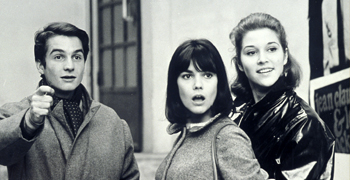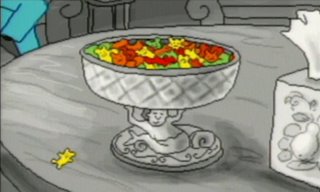18th century philosopher Immanuel Kant claimed that nothing in the world is truly good except a "good will." The radical implication of this claim often goes unnoticed--that a good will is precisely that: no thing. Put another way: there is nothing in the world that is truly good. So the best you can do is wish for another world.
This pessimistic ethical sentiment is the guiding thread of No Country for Old Men, and the key to its strange closing scene. The dream that Sheriff Bell recounts expresses his deep will, despite everything, for the good to be realized, and mirrors his life vainly spent acting as if it could be realized. His final words, "And then I woke up," are his admission that it was a fantasy. That there is nothing in this world that is good. That a good will is nothing. That hope is a self-deception that contributes to the betrayal of human happiness, adding nothing to its fulfillment.
Anyone who tries to twist this ending into a ray of light at the end of the tunnel has utterly missed the point. Like Kantian philosophy, one of the film's greatest merits is that it rigorously, unflinchingly pursues its (dangerous and deeply mistaken) worldview to the bitter end of its logical consequences. Like any great work of art, this film attempts to use fiction to force the audience into a confrontation with reality: to awake us. The bitter taste it leaves in the viewer's mouth is the memory of that collision--or its near-miss.

Sheriff Bell is not really a character in the film, but rather its voice. Like the narrator of a novel, his words take place outside of the story, setting the scene and establishing the very limits of the universe in which the film takes place. That the world is without light or warmth, that it survives only upon the dream (not the hope) of light and warmth, is not a point of view expressed within the film, but the film's ground rules, the very location of the story. Bell's dream is analogous to the film, and his final words are a comment upon the film, not an event within it.

We might be inclined to object, and I hope we will, that this is not an accurate portrayal of our world, but that doesn't change the fact that this is the world in which the film takes place. That must be made clear: the story is not one that takes place in the human or moral world, but a desert world, an entirely natural world stripped of moral truth or meaning. Its principle characters (excepting Bell) are thoroughly natural creatures; they neither have nor fail to have moral motivations; their actions are neither good nor evil, the consequences of those actions neither just nor unjust. The film takes place, to put it another way, after the "death of God"--the news of which, as Nietzsche insisted over 100 years ago, has still not reached us. Its world is "beyond good and evil" in the fullest sense that morality (in the fullest sense) is demoted to the status of a comforting fantasy.
True, Sheriff Bell and his fellow officers do not, at the beginning, realize this. Their profession, their very identities are built upon the attempt to keep hope alive that good and evil do exist, upon the belief that the justice must win out in the end. The development of the film, insofar as its ground rules allow any, is external to its story: the audience, via Bell, must be forcefully made to recognize their fantasy as fantasy. This is part of the essential impossibility of the film--and the greatest obstacle it poses to the audience. Its narrative development is toward the conclusion that all development is a lie. It asks us to become aware of the utter pointlessness and hopelessness and endlessness of the very story it asks us to care about--and of every human story.
Sheriff Bell's initial stance expresses what we might call religious Kantianism (Kant, for the record, was a believer in name only): the belief that the human world is profoundly screwed but that we may, with good will and God's help, repair it. This is not accidentally religious. Kant is beginning from secular grounds: there are no moral facts on the model of natural facts. It is because Kant accepts the secular, scientific interpretation of the natural world that only a second, supernatural world can save us. You see the dangerous game he's playing: if his Deus ex machina doesn't work, we go from a perfectly acceptable form of ordinary morality to a dramatically different point of view: a world without intrinsic value and no external source of value to redeem it. Kant without God, I submit, is nihilism. Or: Bell without hope is Chigurh.
I'm tempted to add that the contemporary western world is--that we are--somewhere between the two, and that the film would have us believe there is no alternative to this path and only one possible end: a world populated entirely by Chigurh's. But that might be taking on more than I can chew--or swallow--at the moment.

So, if Bell is Kant in his most optimistic or self-deceptive moments, then Chigurh is the disallusioned Kant. I take Kant at his word when he claims that his ethical philosophy is, in essence, nothing but the presuppositions of any ordinary conception of morality whatsoever--that his ethical philosophy is a description of what it is for something to be a morality. So I'm just going to go ahead and say it: Chigurh is the disallusioned moralist (insert whichever flavor of contemporary, fat-free morality you personally subscribe to). He represents the reductio ad absurdum of any attempt to preserve morality after rejecting its objective ground and universal application.
What makes Chigurh so damned scary is that he kills dutifully and dispassionately. He is not "insane" or "psychopathic"--he is far too calm and careful for that. He is not "evil"--he has no motives, no passions, so surely no badly-intentioned ones. Surely no one seriously believes he gives a damn about that money. Or that he's capable of "wanting" anything at all, even revenge or sadistic thrills. When he plays a game of heads or tails with his victims, letting them realize that he'll let them live if they win, he does not even seem to enjoy making them squirm. Sickeningly, the audience enjoys this sadistic game more than he does.
In this respect, Chigurh is a model case of the autonomy of the will, which for Kant is equivalent to "good will." An autonomous will acts freely by choosing to act for the sake of duty alone, rather than acting "heteronomously"--that is, in obedience to desire. Any interest, any inclination or motive beyond doing the right thing, counts, in Kantian morality, as a failure of good will. The truly good action is motivated entirely by a desire to do one's duty because it is one's duty.

Chigurh plays with this notion perversely, telling Moss' wife that he has no desire to kill her, but that he made a promise to her husband and so he must keep it. We'd find the killing more forgivable if he'd at least take some pleasure in revenge from her death. But no, she dies for absolutely nothing but the duty to keep an indifferent promise.
While to contemporary ears the language of "duty" sounds stuffy, the point is rather mundane: the morally best person does the right thing because she thinks it's right, not because there's some other advantage attached. And the way we achieve this is by putting aside all of our desires and deciding actions entirely according to the "law" (another painful word for sensitive contemporary sensibilities, but just choose whichever flavor of personal moral rules you subscribe to this week). Chigurh does this marvellously--by not having any interests or motives at all.
This is where the reductio ad absurdum of modern morality really gets going. Kant famously suggests a test to see if the rules we're following are truly moral ones. If they're moral, they should apply universally. Everyone, for example, should probably avoid murdering strangers for losing a coin toss. If this is "bad", surely it's not just bad for Chigurh to do. We are not being old-fashioned prudes for compaining when anyone else does it too: it's a moral law everyone should follow.
So, the test for a moral law is: would it be possible to make the rule you're following into a natural law, which every human being necessarily and without exception followed? In Chigurh's case, the surprising answer is yes. The maxim of Chigurgh's action is: if you decide to do something, let nothing else stand in your way. Could this be made into a natural law? By all means, for it is the rule of all natural events: simply occur. In fact, we might describe Chigurh's characters as nothing other than a personification of natural law, or of necessity as such. He acts without passion or motive and with implacable necessity. He is no more "evil" than a tornado or gangrene. The rules he follows, because they are absolutely consistent in their application and have no basis in a personal incentive or motive, are every bit as consistent with morality as the natural laws that slowly but inevitably guarantee the death of every living creature.
On one level, he is the pure will of Kantian ethics because he has no will. In this respect, he is the image of what is terrifying in nature: a law that is not answerable to human interest or human justice, the limit of the success of morality. The moral of this element in the film--perhaps best exemplified in the viciousness of the dog in the river chase scene, and echoed in a story of a human torture victim held on a dog leash--is that the attempt to rid the world of evil is a quixotic battle with the very laws of nature. (We should well worry about the political implications of this charming moral lesson, especially given the political resonance of the image of the dog-collared torture victim.)
On another level, Chigurh is the pure application of absolutely any arbitrary will, or the logical extreme at which Kantianism self-implodes into universal human degradation. If nothing in the world has value except duty, then there is no objective end--such as say, oh, I don't know, human dignity--that all must dutifully pursue. Our duty becomes to do whatever we happen to think our duty is, even if that's punching holes in the skulls of random strangers with a cattle gun. Duty becomes the rigorous and consistent application of any contingent end any individual happens to assign themselves, and morality becomes the refusal to let any interest--including that of other human beings--interfere with that goal. In a world in which there is truly nothing good, except good will, good will becomes nothing more than doing whatever you happen to find yourself doing and letting no one stand in your way.
Chigurh is, consequently, more than just an image of the terrifying aspect of nature as blind, amoral necessity, he is also the terrifying image of a humanity that uses its freedom to transform itself into blind, amoral necessity.

This pessimistic ethical sentiment is the guiding thread of No Country for Old Men, and the key to its strange closing scene. The dream that Sheriff Bell recounts expresses his deep will, despite everything, for the good to be realized, and mirrors his life vainly spent acting as if it could be realized. His final words, "And then I woke up," are his admission that it was a fantasy. That there is nothing in this world that is good. That a good will is nothing. That hope is a self-deception that contributes to the betrayal of human happiness, adding nothing to its fulfillment.
Anyone who tries to twist this ending into a ray of light at the end of the tunnel has utterly missed the point. Like Kantian philosophy, one of the film's greatest merits is that it rigorously, unflinchingly pursues its (dangerous and deeply mistaken) worldview to the bitter end of its logical consequences. Like any great work of art, this film attempts to use fiction to force the audience into a confrontation with reality: to awake us. The bitter taste it leaves in the viewer's mouth is the memory of that collision--or its near-miss.

Sheriff Bell is not really a character in the film, but rather its voice. Like the narrator of a novel, his words take place outside of the story, setting the scene and establishing the very limits of the universe in which the film takes place. That the world is without light or warmth, that it survives only upon the dream (not the hope) of light and warmth, is not a point of view expressed within the film, but the film's ground rules, the very location of the story. Bell's dream is analogous to the film, and his final words are a comment upon the film, not an event within it.

We might be inclined to object, and I hope we will, that this is not an accurate portrayal of our world, but that doesn't change the fact that this is the world in which the film takes place. That must be made clear: the story is not one that takes place in the human or moral world, but a desert world, an entirely natural world stripped of moral truth or meaning. Its principle characters (excepting Bell) are thoroughly natural creatures; they neither have nor fail to have moral motivations; their actions are neither good nor evil, the consequences of those actions neither just nor unjust. The film takes place, to put it another way, after the "death of God"--the news of which, as Nietzsche insisted over 100 years ago, has still not reached us. Its world is "beyond good and evil" in the fullest sense that morality (in the fullest sense) is demoted to the status of a comforting fantasy.
True, Sheriff Bell and his fellow officers do not, at the beginning, realize this. Their profession, their very identities are built upon the attempt to keep hope alive that good and evil do exist, upon the belief that the justice must win out in the end. The development of the film, insofar as its ground rules allow any, is external to its story: the audience, via Bell, must be forcefully made to recognize their fantasy as fantasy. This is part of the essential impossibility of the film--and the greatest obstacle it poses to the audience. Its narrative development is toward the conclusion that all development is a lie. It asks us to become aware of the utter pointlessness and hopelessness and endlessness of the very story it asks us to care about--and of every human story.
Sheriff Bell's initial stance expresses what we might call religious Kantianism (Kant, for the record, was a believer in name only): the belief that the human world is profoundly screwed but that we may, with good will and God's help, repair it. This is not accidentally religious. Kant is beginning from secular grounds: there are no moral facts on the model of natural facts. It is because Kant accepts the secular, scientific interpretation of the natural world that only a second, supernatural world can save us. You see the dangerous game he's playing: if his Deus ex machina doesn't work, we go from a perfectly acceptable form of ordinary morality to a dramatically different point of view: a world without intrinsic value and no external source of value to redeem it. Kant without God, I submit, is nihilism. Or: Bell without hope is Chigurh.
I'm tempted to add that the contemporary western world is--that we are--somewhere between the two, and that the film would have us believe there is no alternative to this path and only one possible end: a world populated entirely by Chigurh's. But that might be taking on more than I can chew--or swallow--at the moment.

So, if Bell is Kant in his most optimistic or self-deceptive moments, then Chigurh is the disallusioned Kant. I take Kant at his word when he claims that his ethical philosophy is, in essence, nothing but the presuppositions of any ordinary conception of morality whatsoever--that his ethical philosophy is a description of what it is for something to be a morality. So I'm just going to go ahead and say it: Chigurh is the disallusioned moralist (insert whichever flavor of contemporary, fat-free morality you personally subscribe to). He represents the reductio ad absurdum of any attempt to preserve morality after rejecting its objective ground and universal application.
What makes Chigurh so damned scary is that he kills dutifully and dispassionately. He is not "insane" or "psychopathic"--he is far too calm and careful for that. He is not "evil"--he has no motives, no passions, so surely no badly-intentioned ones. Surely no one seriously believes he gives a damn about that money. Or that he's capable of "wanting" anything at all, even revenge or sadistic thrills. When he plays a game of heads or tails with his victims, letting them realize that he'll let them live if they win, he does not even seem to enjoy making them squirm. Sickeningly, the audience enjoys this sadistic game more than he does.
In this respect, Chigurh is a model case of the autonomy of the will, which for Kant is equivalent to "good will." An autonomous will acts freely by choosing to act for the sake of duty alone, rather than acting "heteronomously"--that is, in obedience to desire. Any interest, any inclination or motive beyond doing the right thing, counts, in Kantian morality, as a failure of good will. The truly good action is motivated entirely by a desire to do one's duty because it is one's duty.

Chigurh plays with this notion perversely, telling Moss' wife that he has no desire to kill her, but that he made a promise to her husband and so he must keep it. We'd find the killing more forgivable if he'd at least take some pleasure in revenge from her death. But no, she dies for absolutely nothing but the duty to keep an indifferent promise.
While to contemporary ears the language of "duty" sounds stuffy, the point is rather mundane: the morally best person does the right thing because she thinks it's right, not because there's some other advantage attached. And the way we achieve this is by putting aside all of our desires and deciding actions entirely according to the "law" (another painful word for sensitive contemporary sensibilities, but just choose whichever flavor of personal moral rules you subscribe to this week). Chigurh does this marvellously--by not having any interests or motives at all.
This is where the reductio ad absurdum of modern morality really gets going. Kant famously suggests a test to see if the rules we're following are truly moral ones. If they're moral, they should apply universally. Everyone, for example, should probably avoid murdering strangers for losing a coin toss. If this is "bad", surely it's not just bad for Chigurh to do. We are not being old-fashioned prudes for compaining when anyone else does it too: it's a moral law everyone should follow.
So, the test for a moral law is: would it be possible to make the rule you're following into a natural law, which every human being necessarily and without exception followed? In Chigurh's case, the surprising answer is yes. The maxim of Chigurgh's action is: if you decide to do something, let nothing else stand in your way. Could this be made into a natural law? By all means, for it is the rule of all natural events: simply occur. In fact, we might describe Chigurh's characters as nothing other than a personification of natural law, or of necessity as such. He acts without passion or motive and with implacable necessity. He is no more "evil" than a tornado or gangrene. The rules he follows, because they are absolutely consistent in their application and have no basis in a personal incentive or motive, are every bit as consistent with morality as the natural laws that slowly but inevitably guarantee the death of every living creature.
On one level, he is the pure will of Kantian ethics because he has no will. In this respect, he is the image of what is terrifying in nature: a law that is not answerable to human interest or human justice, the limit of the success of morality. The moral of this element in the film--perhaps best exemplified in the viciousness of the dog in the river chase scene, and echoed in a story of a human torture victim held on a dog leash--is that the attempt to rid the world of evil is a quixotic battle with the very laws of nature. (We should well worry about the political implications of this charming moral lesson, especially given the political resonance of the image of the dog-collared torture victim.)
On another level, Chigurh is the pure application of absolutely any arbitrary will, or the logical extreme at which Kantianism self-implodes into universal human degradation. If nothing in the world has value except duty, then there is no objective end--such as say, oh, I don't know, human dignity--that all must dutifully pursue. Our duty becomes to do whatever we happen to think our duty is, even if that's punching holes in the skulls of random strangers with a cattle gun. Duty becomes the rigorous and consistent application of any contingent end any individual happens to assign themselves, and morality becomes the refusal to let any interest--including that of other human beings--interfere with that goal. In a world in which there is truly nothing good, except good will, good will becomes nothing more than doing whatever you happen to find yourself doing and letting no one stand in your way.
Chigurh is, consequently, more than just an image of the terrifying aspect of nature as blind, amoral necessity, he is also the terrifying image of a humanity that uses its freedom to transform itself into blind, amoral necessity.













































